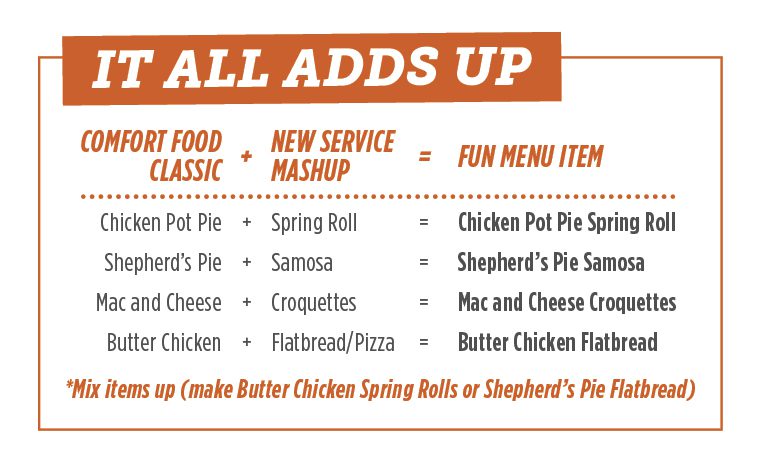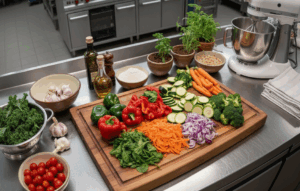This article originally appeared in the Gordon Food Service Foodscape publication.
Consumers’ tastes and preferences change, but one trend that sticks around is comfort food. People gravitate toward comfort food. As the holiday season approaches, it’s a good time to make it a menu star.
Taking comfort foods to new heights takes more than just adding time-tested favorites to the menu. As with any recipe for success, it takes a pinch of nuance and a dash of playfulness.
“It is a great idea to elevate your comfort food offerings to make it your own version,” says Chef Matt Dummar, a Gordon Food Service Culinary Specialist in Houston.
He recommends three ways to make comfort food a menu star:
1. Elevate it—improve the perception and value for customers.
2. Create a service mashup—marry two comfort food icons.
3. Classic with a twist—get global with it.
Elevating comfort food
By definition, comfort food is enjoyable. Even so, getting customer orders calls for a strong menu description. Consumers pay more when menu descriptions are enticing and unique.
Weak: Shepherd’s pie.
Strong: Shepherd’s pie with Guinness demi glace and topped with Stilton mashed potatoes.
Weak: Mashed Potatoes
Strong: Whipped Yukon Potatoes with mascarpone and chives
“You don’t want to overdo it,” Dummars notes. “But a small investment in one or two very flavorful and perceived exotic elements can send a dish to a much higher level.”
Create a new service mashup
Mashups aren’t new, but comfort food can appeal to many tastes. Some consumers aren’t willing to try something unfamiliar. By elevating the classics with a global mashup, you attract both adventurous and guarded eaters.
“Be creative by swapping out one or two key ingredients with unique offerings,” Dummars says. “Swap out the egg noodles in chicken noodle soup with ramen noodles, and add a touch of coconut milk, ginger and soy sauce to your otherwise classic recipe, and you have a global mashup.”
Some quick overhauls allow expanded comfort food offerings with minimal work. The practice calls on cross-utilization of ingredients. Advantages include:
- Reducing labor costs.
- Decreasing the variety of products to buy and store.
- Limiting vendor deliveries (and costs associated with maintaining multiple vendors).
- Keeping inventory low and creating optimum freshness and quality.
How it works: Make extra volume of your chicken pot pie base and use it in a spring roll wrapper as an appetizer or sharing plate.

Go from classic to trendy
Even consumers who want new and exciting offerings gravitate to comfort foods. The sales prove it, Dummars notes.
Because familiar foods help people feel better, ask your staff what foods they ate growing up. Then give it a twist.
“Feature one of those items as specials. If one of them takes off and is popular, look at ways you can possibly elevate it from a comfort food classic to a trendy dish,” Dummars says.
One example might be lasagna. The traditional Italian classic can take on a Korean-style twist.
Sauce: Turn the bolognese meat sauce into a Korean bulgogi sauce or barbecue sauce. A white sauce variation could be made using gochujang.
Noodles: Use fried wontons or spring roll wraps as the lasagna noodles.
Cheese: Include a little smoked cheddar to elevate all ingredients.
“It’s an exciting and interesting alternative,” Dummars says. “And you can charge a menu price in line with food costs and the perception of a comfort food menu star.”










